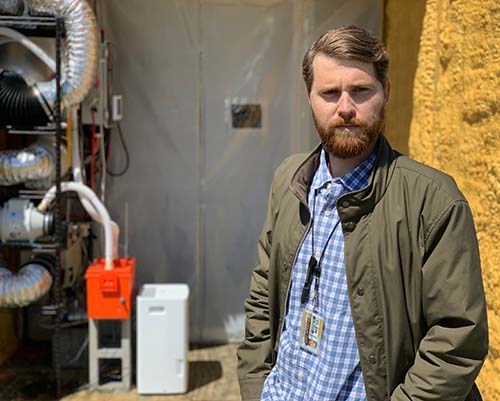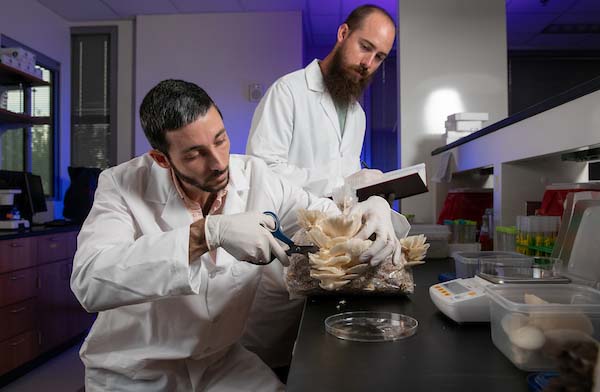

KENNESAW, Ga. | Jul 6, 2020
Imagine being able to sustainably produce a nutritious and delicious food product that is not constrained by specific environmental conditions required to support a predominately plant-based agricultural industry.
Kennesaw State University researcher Christopher Cornelison is exploring the possibilities of improving the food supply chain by leveraging innovative technology to expand the opportunities for mushroom production in Georgia.
“We must be able to develop sustainable methods for producing readily preserved and nutritious foods without regional climactic limitations,” said Cornelison, an assistant professor of microbiology in the College of Science and Mathematics and director of the BioInnovation Laboratory at KSU. “Mushrooms are an ideal crop as they only rely on three environmental factors that can be regulated to optimize growth yield—humidity, temperature and carbon dioxide concentrations.”

Although sales of these spore-bearing fruiting bodies of fungi accounted for more than $3.1 billion in U.S. economic impact according to a 2019 American Mushroom Institute report, they are still underutilized.
Cornelison said more than half of the nation’s mushroom production is associated with a single county in Pennsylvania. The substrate used in this production, primarily mulch, is transported from the Midwest to meet the demand.
That is why Cornelison is now focused on determining the feasibility of growing culinary and commodity mushrooms in Georgia via low-cost and efficient production systems housed in modified shipping containers with embedded environmental control systems.
With a new $25,000 award from the venture development program of the Georgia Research Alliance (GRA), Cornelison’s goal is to study the potential commercialization of growing these mushrooms on media or substrates of regional agricultural wastes such as peanut shells, corn chaff or spent brewing grains.
This GRA program is the state’s only nonprofit catalyst for providing universities seed funds and access to mentors and consultants in forming companies around their research.
“Georgia has the resources to compete in this market with the appropriate application of technology and coordination of resources, namely agricultural wastes such as potential partnerships with existing industrial and agricultural operations,” Cornelison said. “Part of our assessment will include determining production timing and yield rates with select wastes and the oyster mushroom as a model organism.”

The team, led by Cornelison, is made up of co-investigator Kyle Gabriel, a research scientist in the BioInnovation Laboratory, and Daniel Rhiner, a master’s student in KSU’s integrative biology program.
With this GRA grant, KSU was also one of just two institutions to be invited to participate in the inaugural cohort of the Greater Yield initiative, recently launched by Lee Herron, GRA’s vice president of venture development. The Greater Yield initiative’s primary objective is to support university start-up companies focused on agricultural and food technology.
“We are incredibly grateful for the funding, and it is an honor for me and for KSU to be included in this new Greater Yield initiative,” said Cornelison. “This allows us to move the project in a direction that we are really excited to explore and to access some mentorships that will not only benefit us immediately with this project, but also have a cascading benefit for our laboratory and how we think about all of our projects.”
In preparation for this phase of the project, Cornelison and Gabriel spent the last three years planning and building the experimental cultivation chamber within a shipping container. The work was supported by a Specialty Crop Block Grant from the Georgia Department of Agriculture.
“This method allows for production of a high value crop on low or zero value substrates without the requirement of arable land,” said Cornelison. “This approach is also highly modular, allowing for production to be placed according to market need and moved and expanded as trends shift.”
The low-cost, small-footprint prototype of a semi-automated mushroom production facility, currently located at the KSU Field Station, can easily be set up anywhere, even in densely populated cities. Gabriel designed the embedded environmental control system with software, called Mycodo, which he developed and continuously updates as an open source online application.
“We do have a very significant competitive advantage in the fact that there is so little up-front cost,” Cornelison said. “The requirements to start this up is really unheard of, certainly not what you typically see in life sciences and technology start-up companies.”
– Joëlle Walls
A leader in innovative teaching and learning, Kennesaw State University offers undergraduate, graduate, and doctoral degrees to its more than 51,000 students. Kennesaw State is a member of the University System of Georgia with 11 academic colleges. The university's vibrant campus culture, diverse population, strong global ties, and entrepreneurial spirit draw students from throughout the country and the world. Kennesaw State is a Carnegie-designated doctoral research institution (R2), placing it among an elite group of only 8 percent of U.S. colleges and universities with an R1 or R2 status. For more information, visit kennesaw.edu.